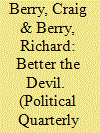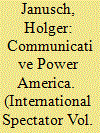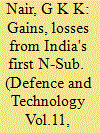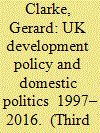|
|
|
Sort Order |
|
|
|
Items / Page
|
|
|
|
|
|
|
| Srl | Item |
| 1 |
ID:
130944


|
|
|
|
|
| Publication |
2014.
|
| Summary/Abstract |
Gus O'Donnell's vision of 'better government' is presented as a critique of party politics, most specifically the short-termism, selfishness and incompetence of elected politicians. There are few people better placed than O'Donnell to form such judgements. However, O'Donnell goes much further, by calling into question the legitimacy of the democratic system which gives rise to party politics. His article outlines several mechanisms by which the exercise of power by elected ministers could be constrained by a managerialist accountability framework, without addressing the question of who determines the appropriate framework for ministerial performance. The House of Commons is condemned as 'too politicised'. O'Donnell also offers substantial praise for apparently 'depoliticised' policy-making processes, overlooking the inherently political constitution of such processes. In doing so, O'Donnell claims to be challenging party politics on behalf of voters/taxpayers, but instead seeks to dismantle any possibility of the public expressing a collective will via the ballot box that might challenge the immutability of the market economy.
|
|
|
|
|
|
|
|
|
|
|
|
|
|
|
|
| 2 |
ID:
186124


|
|
|
|
|
| Summary/Abstract |
President Trump’s credo ‘America First’ marked an end to American exceptionalism. Against this backdrop, President Biden aims to restore America’s moral leadership. Yet, he lacks a clear vision. Against the Trump doctrine and realist arguments for the end of a values-driven foreign policy, we propose a vision for a US foreign policy guided by self-restraint and critical self-reflection. We argue that following such vision is in the strategic interest of the United States. The search for a vision for a US grand strategy is not just an abstract question for International Relations scholars, but of high importance for practice. Shared visions are crucial if not necessary for successful leadership.
|
|
|
|
|
|
|
|
|
|
|
|
|
|
|
|
| 3 |
ID:
129343


|
|
|
|
|
| Publication |
2012.
|
| Summary/Abstract |
the induction of the nuclear powered chakra submarine on wet lease from Russia from 1987 to 1991, it was the prelude to the political and strategic vision to embark on a blue water underwater capability akin to the developed countries. However the vision was compulsively short closed owing to the changed political leadership in India and the breakup of the Soviet Union.
|
|
|
|
|
|
|
|
|
|
|
|
|
|
|
|
| 4 |
ID:
113852


|
|
|
|
|
| Publication |
2012.
|
| Summary/Abstract |
International Relations theory does not distinguish enough between prediction and vision, and, as a result, retreats unduly from practice. This article argues for the importance of political vision in the study of international relations by complicating the standard social science distinction between fact and value. Using Nietzschean genealogy, it argues for a dual relationship between the normative and the empirical: the deduction of norms from the constraints of history; and the normative, proactive responses to this history within these constraints. This dual relationship underscores the importance of political vision and political leadership in the study of international politics. The article then analyses present historical challenges and suggests several normative responses to them that can be understood in the terms of 'political vision' in International Relations. It finally takes the example of the present absence of vision and leadership in the European Union and argues for a political Europe, the Union as a political power.
|
|
|
|
|
|
|
|
|
|
|
|
|
|
|
|
| 5 |
ID:
157707


|
|
|
|
|
| Summary/Abstract |
Debate surrounds the relative importance of development aid and development policy in donor efforts to support international development. Likewise, the literature on UK development policy points to its putative stability and consistency over time. Both perspectives, however, underplay the political contention which characterises UK development policy and its variable effects. This article, therefore, examines UK development policy between 1997 and 2016 and the varying extent to which it gave rise to contentious politics over time. It explores three politically-significant periods in the context of UK development policy between 1997 and 2016: the first between 1997 and 2003, characterised, I argue, by political consensus and managed contention; a second between 2003 and 2010, characterised by transition and emerging political contention; and a third, between 2010 and 2016, characterised by contentious politics and political fracturing. I associate the first period with effective political vision and direction and the third with a significant erosion of both, to the detriment of UK development policy and its efficacy. In conclusion, I argue that UK development policy has been most effective when it has been underpinned by a clear and consensual political vision.
|
|
|
|
|
|
|
|
|
|
|
|
|
|
|
|
|
|
|
|
|